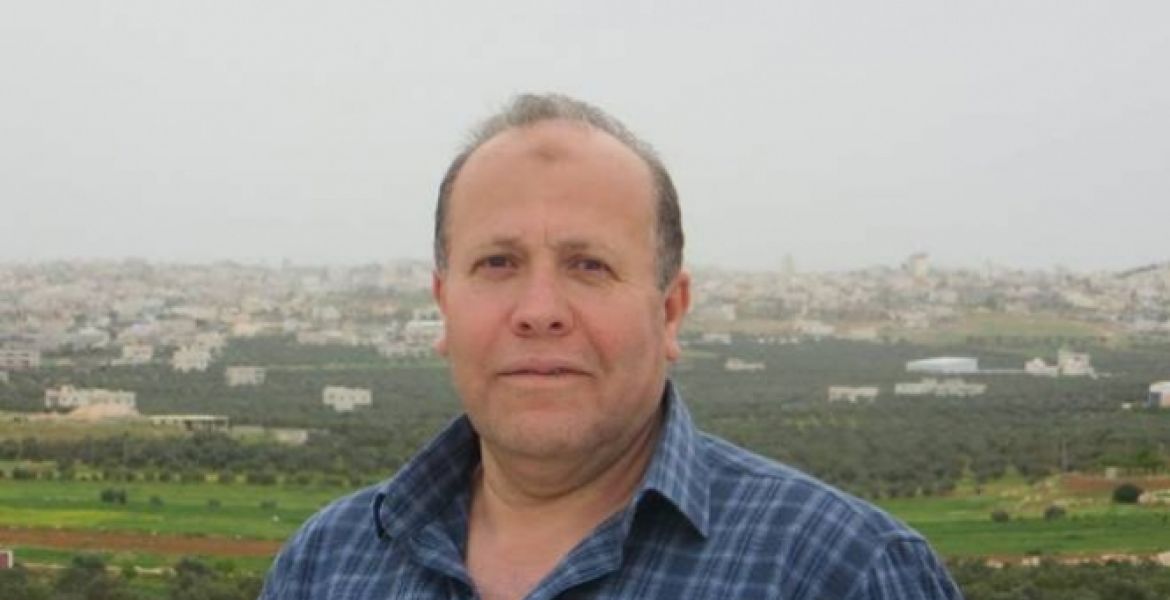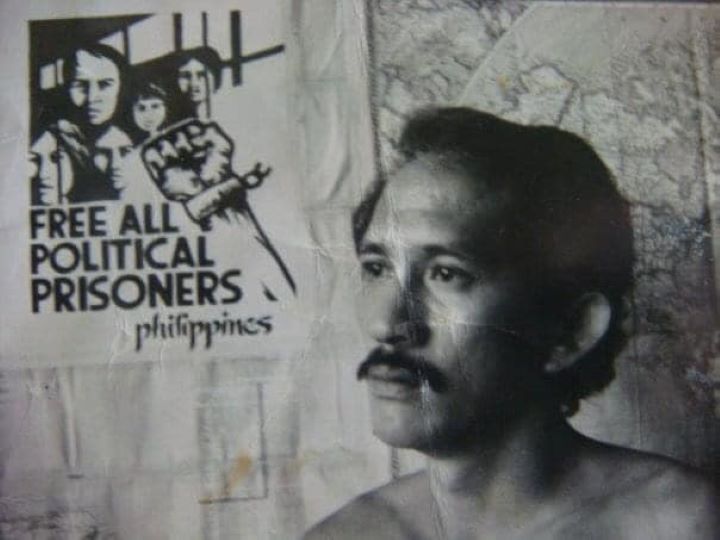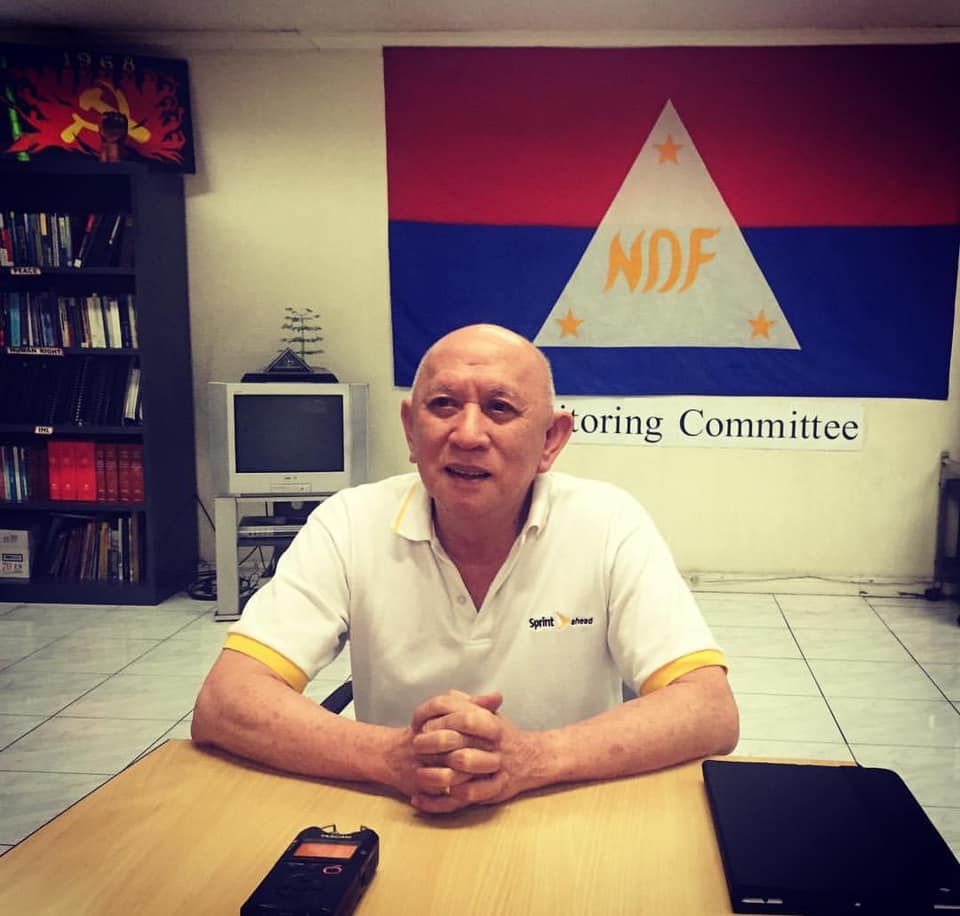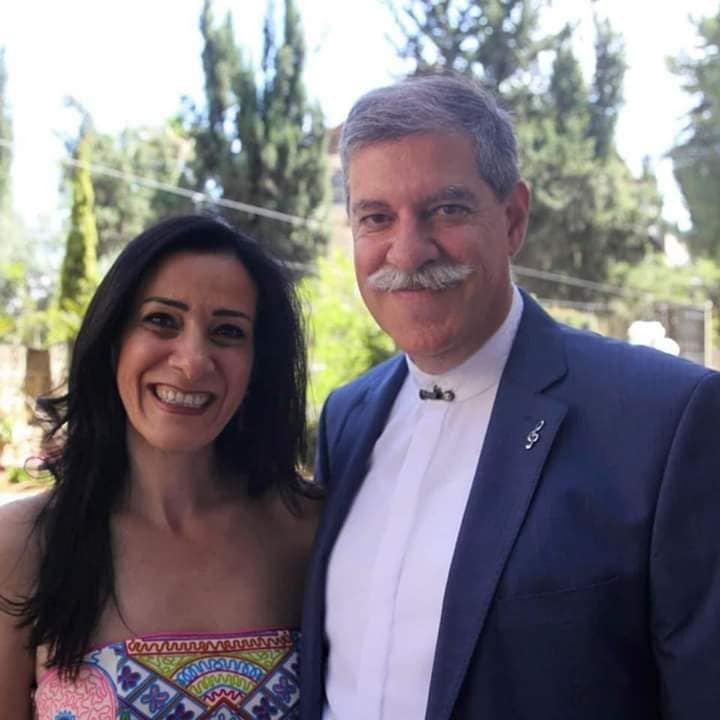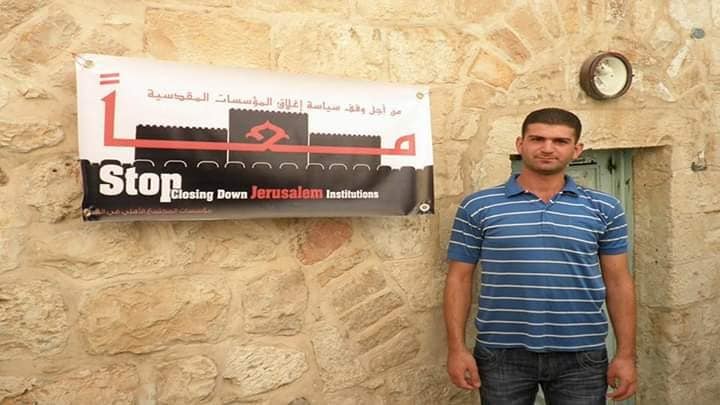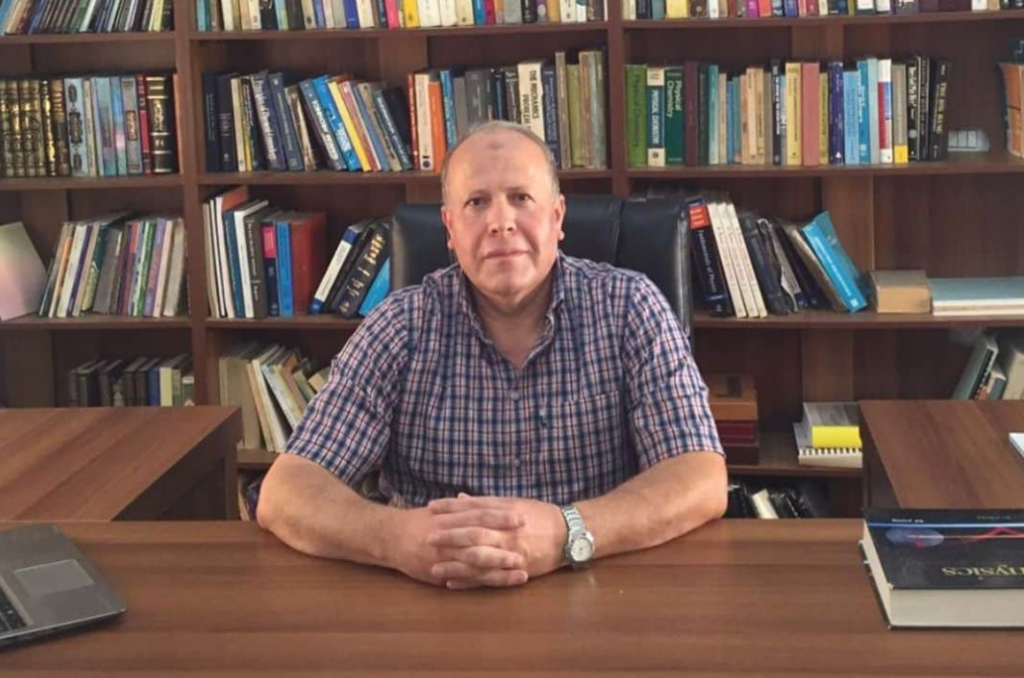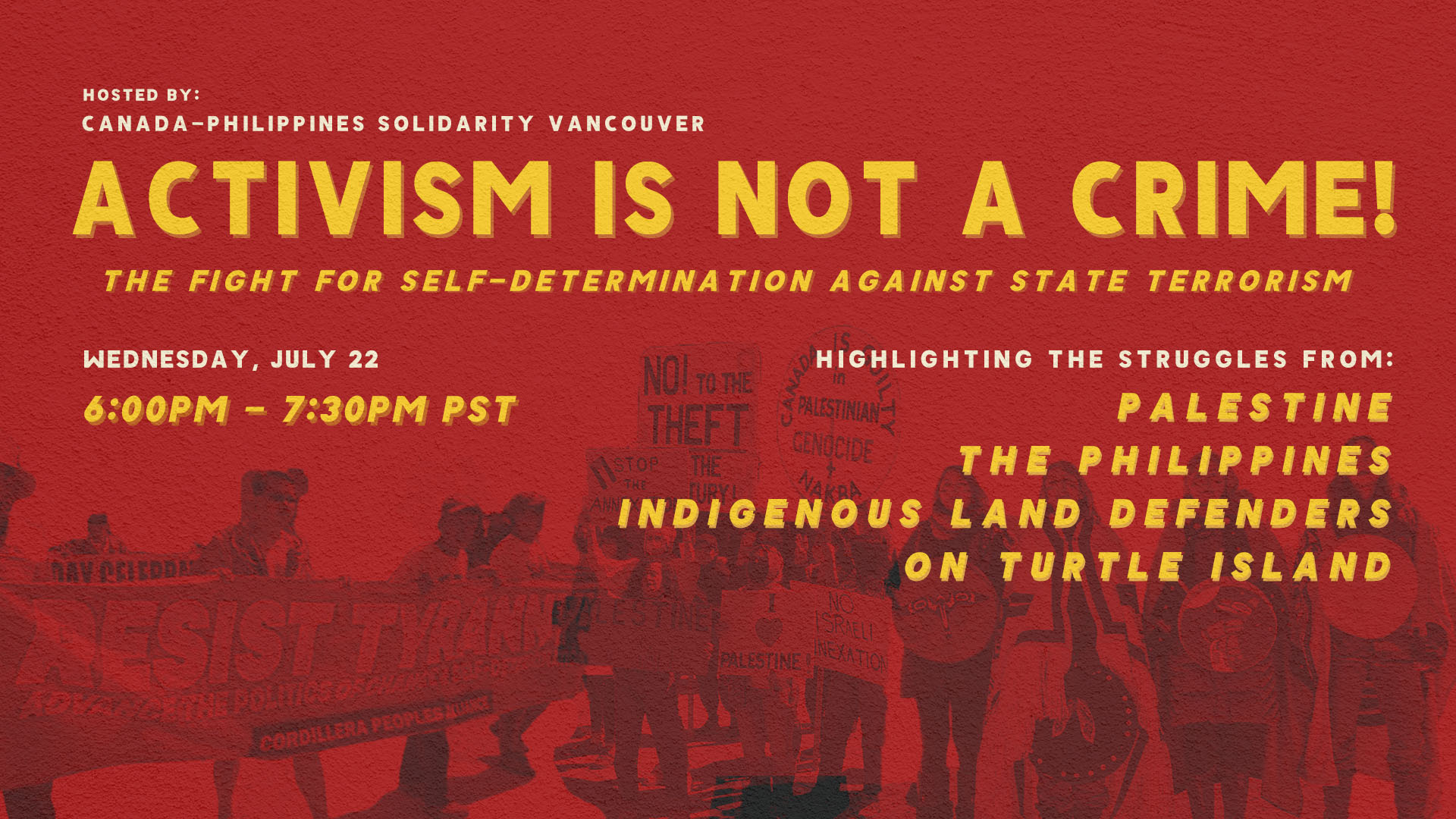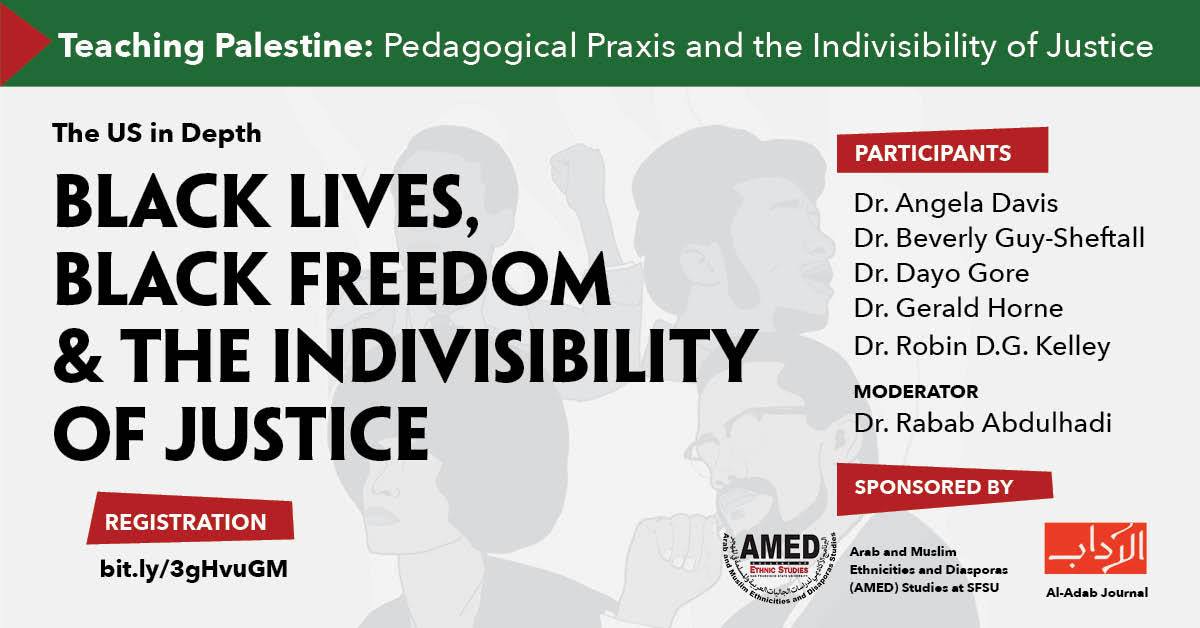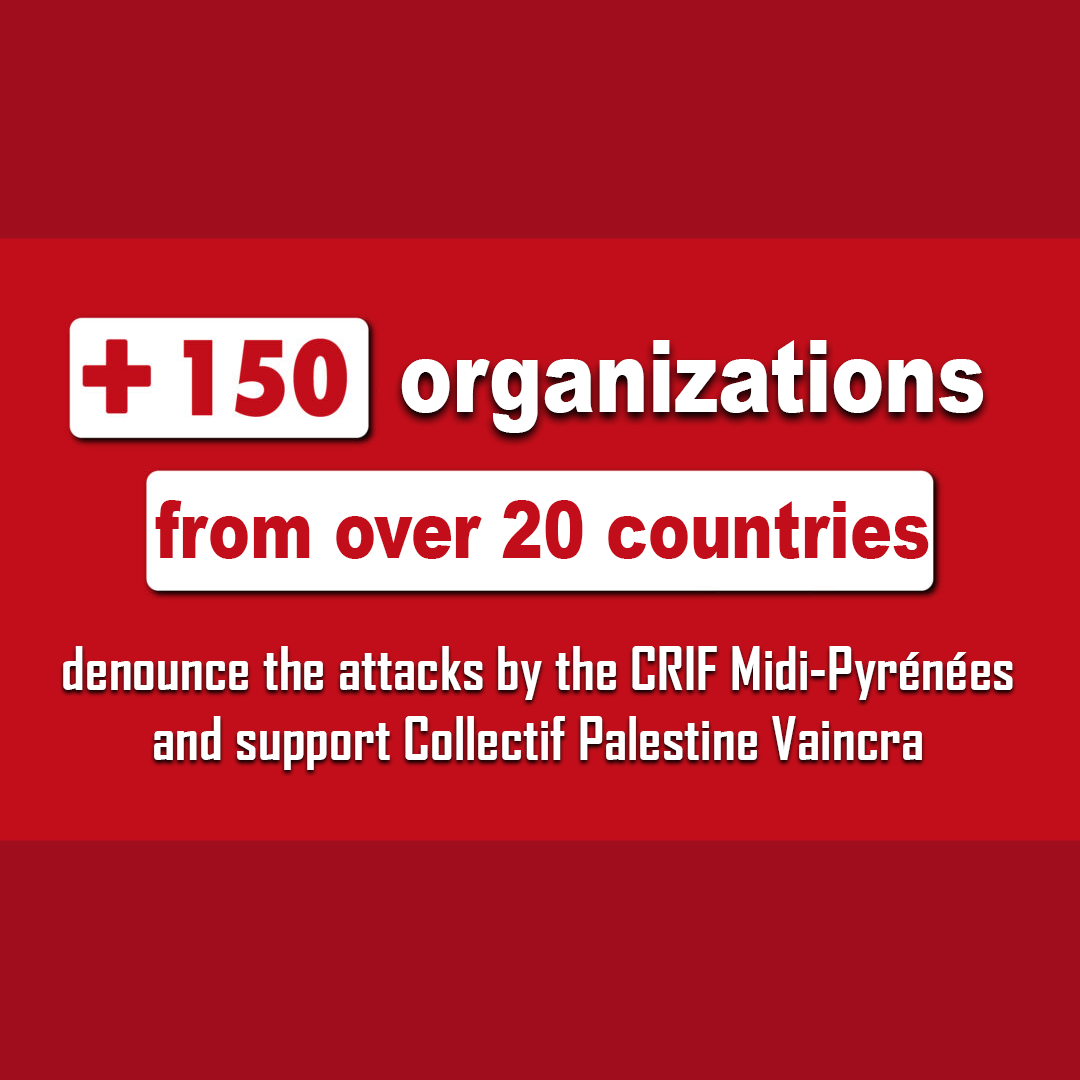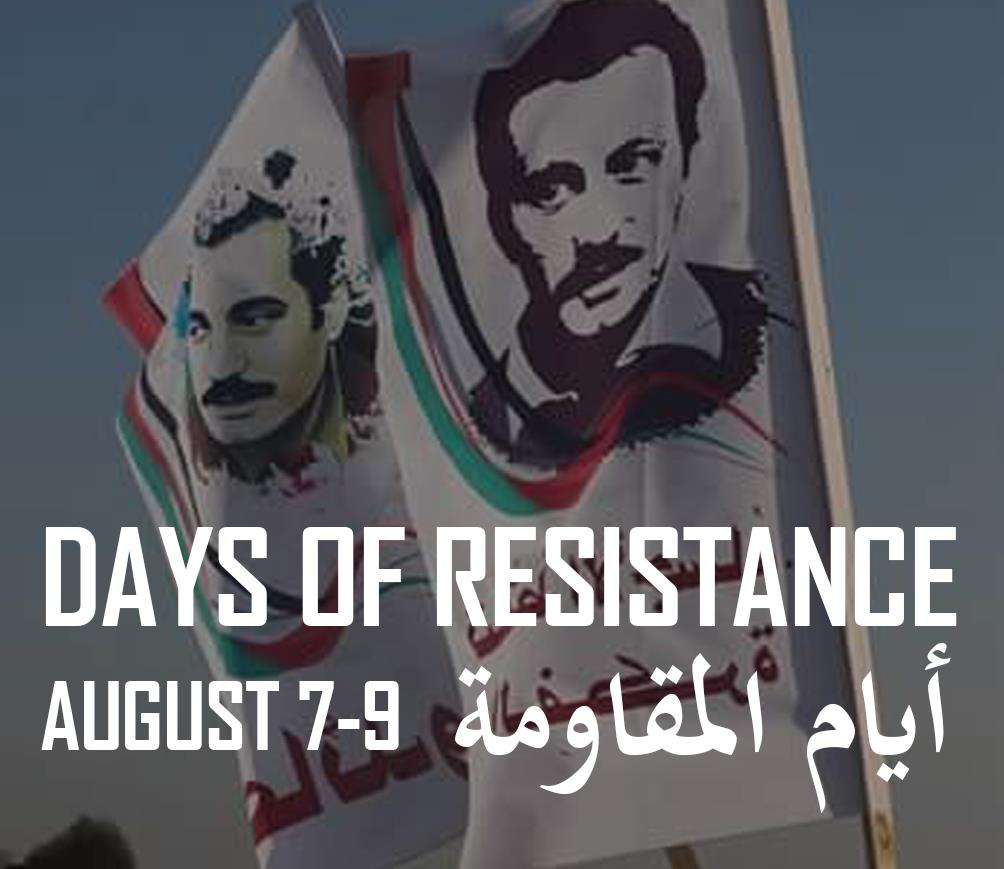
Over 100 organizations have joined Samidoun Palestinian Prisoner Solidarity Network in the call for the Days of Resistance for Palestine, 7-9 August 2020, including National Students for Justice in Palestine in the United States, Within Our Lifetime – United for Palestine, the Palestinian Youth Movement, and Al-Awda, the Palestine Right to Return Coalition. Events are planned in New York, Vancouver, Charleroi, Manchester and Copenhagen, with more action announcements forthcoming. (See upcoming events below)
Today, the program of Israeli annexation continues to threaten Palestinians in the West Bank, including the most fertile agricultural land of the Jordan Valley, which is still slated for Israel’s latest land grab. Of course, this is simply the continuation of over 72 years of land theft, dispossession, apartheid and genocide – but it requires continued mobilization and action to confront, alongside the siege on Gaza, the mass imprisonment of Palestinians, the demolition of homes, the denial of Palestinian refugees’ right to return and further war crimes and crimes against humanity.
Annexation is a continuing threat – especially if the Israeli state thinks that it can pass unnoticed without continued resistance. The struggle is not over; in many ways, it has just begun. We urge you to continue mobilizing to defend the land and people of Palestine and join us in the Days of Resistance, August 7-9.
Get involved:
Read the statement in Arabic | Spanish | French | Swedish
If you are organizing an event, would like materials for your action, or have questions, please contact us at samidoun@samidoun.net or message us on Facebook.
Endorsers of the Days of Resistance:
- Al-Awda, the Palestine Right to Return Coalition
- Al-Karama, Palestinian Women’s Mobilization
- AFPS 63 (Association France Palestine Solidarité, Clermont-Ferrand)
- AFPS Sainté
- Africa for Palestine
- Alliance for Water Justice in Palestine
- American Muslims for Palestine – New Jersey
- Anti Imperialist Action Ireland
- Anti-Imperialist Camp (Vienna)
- Arizona Palestine Solidarity Alliance – Phoenix
- Associazione Amicizia Sardegna Palestina
- Australia Solidarity with Latin America
- Bangor and Ynys Mon Peace and Justice Group
- Bay Area Women in Black
- BDS Bahrain
- BDS Los Angeles
- BDS – New Zealand
- BDS Vancouver – Coast Salish Territories
- BOL (Bridge of Life)
- Brighton & Hove (UK) Palestine Solidarity Campaign
- Cambridge Bethlehem People to People
- Campagne Unitaire Pour la Libération de Georges Abdallah (Ile de France)
- Campaign to Boycott Supporters of Israel in Lebanon
- Campaign to Free Ahmad Sa’adat
- Campuses for Palestine
- Canada Palestine Association
- Canada Palestine Support Network (CanPalNet)
- Canada-Philippines Solidarity for Human Rights (CPSHR)
- Canadian BDS Coalition
- Chico Palestine Action Group.
- Citizens International
- Coalition Against Israeli Apartheid
- CODEPINK
- CODEPINK NYC
- Collectif Palestine Vaincra
- Collectif Rouge Internationaliste pour la Défense des Prisonniers Révolutionnaires (Paris- France)
- Collettivo Palestina Rossa
- Comité d’Action et de Soutien aux Luttes du Peuple Marocain (Paris- France)
- Comité pour une Paix Juste au Proche-Orient (Luxembourg)
- Communist Party of India (Marxist-Leninist) Liberation
- Cordillera Peoples Alliance
- Dallas Palestine Coalition
- Dar al Janub – Union for Antiracism and Peace Policy
- Finnish-Arab Friendship Society
- Food Not Bombs Solidarity
- Free CUNY!
- Free Palestine Movement
- Freedom Road Socialist Organization
- Freedom Socialist Party
- GABRIELA BC
- Global Campaign to Return to Palestine
- Groupe Non-Violent LOUIS LECOIN
- Hilton Head for Peace
- ILPS Commission 10
- International Indigenous Peoples Movement for Self-Determination and Liberation (IPMSDL)
- International Jewish Anti-Zionist Network-Canada
- Independent Jewish Voices Canada
- Independent Jewish Voices – University of British Columbia
- International Action Center
- International Concerned Family & Friends of Mumia Abu-Jamal
- International League of People’s Struggle
- Internationalt Forum – Middle East Group
- Jewish Voice For Peace, Central Ohio
- Jewish Voice for Peace, Las Vegas chapter
- Jewish Network for Palestine
- Jews for Palestinian Right of Return
- Justice for Palestinians-Calgary
- Just Peace Advocates
- JVP San Diego
- Kenya Palestine Solidarity Movement
- L’avenir Palestinien
- Labor for Palestine
- Leonard Peltier Defense Committee
- Letters for Palestine
- Lutherans for Justice in the Holy Land
- MWAKENYA-DTM
- NY4Palestine
- Maoist Communist Party- Organizing Committee
- National Democratic Front of the Philippines
- National Lawyers Guild Palestine Subcommittee
- National Students for Justice in Palestine
- Nevadans for Palestinian Human Rights
- New York City Jericho Amnesty Movement
- Niagara Movement for Justice in Palestine-Israel (NMJPI)
- Northeast Political Prisoner Coalition
- Oakville Palestinian Rights Association
- Paix Juste au Proche Orient – Ecaussinnes (Belgium)
- Palestine Solidarity Campaign South Africa
- Palestine Solidarity Collective at York University
- Palestine Solidarity Network Aotearoa
- Palestine Solidarity Network – Auckland
- Palestinian and Jewish Unity (PAJU)
- Palestinian Canadian Friendship Association
- Palestinian Refugees Rights in Sweden
- Palestinian Youth Movement
-
- Peoples Freedom Network
- Peoples Power Assemblies NYC
- People’s Strike
- People for Palestinian-Israeli Justice
- Philippines-Palestine Friendship Association
- PJPO (Paix juste au Proche Orient) Coordination Brabant Wallon
- Plate-forme Charleroi-Palestine
- Popular Conference of Palestinians Abroad
- Project South
- Queer Palestinian Empowerment Network
- Rank and File Action
- Red Banner Anti-Imperialist Collective
- Reforest the Earth, UK
- Revolutionary Communist Group / Fight Racism! Fight Imperialism!
- Sandiwa Network of Advocates for National Minority
- San Diego County Central Committee of the Peace and Freedom Party of California
- SDSU Students for Justice in Palestine
- SFU Students for Justice in Palestine
- Ship to Gaza – Sweden
- Single Mothers Association of Kenya
- Socialist Action – Canada
- Solidarity for Palestinian Human Rights – Kingston, Ontario
- Solidarity for Palestinian Human Rights – McMaster University
- Solidarity for Palestinian Human Rights – University of British Columbia
- Struggle – La Lucha for Socialism
- Students for Justice in Palestine, University of South Carolina
- South African BDS Coalition
- Stand with Kashmir
- Sulong UBC
- The Palestine Project
- The Red Nation
- Tunisian campaign to boycott and oppose normalization with the Zionist entity
- Unione Democratica Arabo Palestinese
- US Campaign for the Academic and Cultural Boycott of Israel
- Utahns for a Just Peace in the Holy Land
- Victory to the Intifada
- V-SB, Flemish Socialist Movement
- Within Our Lifetime – United for Palestine
- Women in Solidarity with Palestine (WSP) – Toronto
- Women of Diverse Origins/Femmes de diverses origines
- Workers World Party
Add your organization, collective or group’s endorsement at the link: https://docs.google.com/forms/d/e/1FAIpQLScT3bduPO1aINxKdDD9BnlhfIisuyWyCdB5HZe7UGvhX59oEw/viewform?usp=sf_link
Events and actions:
Samidoun Network in occupied Palestine and in the diaspora urges all to consider the days of Friday, Saturday and Sunday, 7 through 9 August, as days of comprehensive struggle, resistance and popular organizing against Zionist colonization throughout occupied Palestine, days of organizing demonstrations and political, cultural and media activities throughout Palestine, in exile and diaspora and everywhere around the world. These actions confront the ongoing Israeli crimes against the Palestinian people, including the Zionist “annexation” project and the deadly siege on Gaza, and aim to strengthen international solidarity with the Palestinian struggle and with the Palestinian prisoners’ movement inside Israeli occupation jails.
If you are organizing an event, would like materials for your action, or have questions, please contact us at samidoun@samidoun.net or message us on Facebook. You can also add your event at the form: https://docs.google.com/forms/d/e/1FAIpQLSfNaThNLE4IvJkYBt_NidTS8goYdvJsDXq_rHKrPWjCRq9QWg/viewform?usp=sf_link
Online Event (in Arabic):
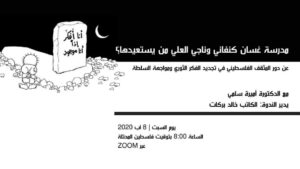 Ghassan Kanafani and Naji al-Ali: How to restore their path?
Ghassan Kanafani and Naji al-Ali: How to restore their path?
Saturday, 8 August
10 am Pacific – 1 pm Eastern – 7 pm Europe – 8 pm Palestine
Facebook: https://www.facebook.com/events/334711407919981/
Join over Zoom or watch on Facebook Live
Organized by Samidoun Network in occupied Palestine with Palestinian Youth Movement, HIRAK (Palestinian Youth Mobilization in Berlin), Al-Naqab Center for Youth Activities
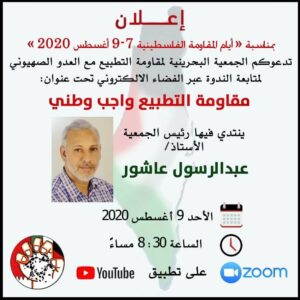 Online Event (in Arabic):
Online Event (in Arabic):
Boycott as a National Duty
Sunday, 9 August
10:30 am Pacific – 1:30 pm Eastern – 7:30 pm Europe – 8:30 pm Palestine
Watch on YouTube Live: https://www.youtube.com/watch?v=6gy1i0HQDEg
Organized by BDS Bahrain
Online Event (in Portuguese)
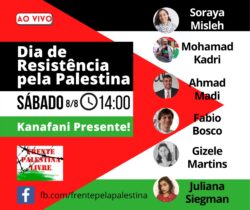 Day of Resistance for Palestine
Day of Resistance for Palestine
Saturday, 8 August
10 am Pacific – 1 pm Eastern 2:00 pm Brazil – 8 pm Palestine
Online Event on Facebook Live
Facebook: https://www.facebook.com/events/2725066504379134/
Organized by Frente em Defesa do Povo Palestino
New York City, NY:
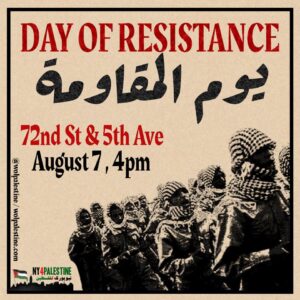 DAY OF RESISTANCE Demonstration to Defend Palestine
DAY OF RESISTANCE Demonstration to Defend Palestine
Friday, 7 August
4:00 pm
72nd St and 5th Avenue
Bay Ridge, Brooklyn, NYC, US
Facebook Page: https://www.facebook.com/events/1155028838189165
Organized by NY4Palestine, led by Within Our Lifetime – United for Palestine
Copenhagen, Denmark:
 Stop Annexation in Palestine – Palestinian People’s Kitchen with Mohammed Khatib
Stop Annexation in Palestine – Palestinian People’s Kitchen with Mohammed Khatib
Friday 7 August
5:30 pm
Folkets Hus
Stengade 50
Copenhagen, Denmark
More info: https://www.facebook.com/events/298446194730505/
Organized by Stop Annekteringen af Palæstina 2020
Las Vegas, NV:
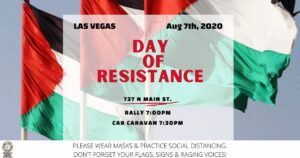 Day of Resistance Demonstration and Car Caravan
Day of Resistance Demonstration and Car Caravan
Friday, 7 August
7:00 pm
737 N Main Street
Las Vegas, NV
Facebook: https://www.facebook.com/events/s/day-of-resistance/691968751358813
Organized by Nevadans for Palestinian Human Rights, Jewish Voice for Peace – Las Vegas
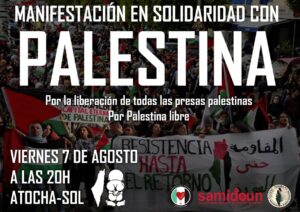 Madrid, Spanish State:
Madrid, Spanish State:
Demonstration in Solidarity with Palestine
Friday, 7 August
8:00 pm P
Atocha to Sol
Madrid, Spain
Facebook: https://www.facebook.com/events/610593346525768/
Organized by Alkarama Palestinian Women’s Mobilization, Samidoun, Unadikum
Boston, MA:
 Stand Out for the Days of Resistance
Stand Out for the Days of Resistance
Saturday, 8 August
11:00 am
Porter Square MBTA Stop
Cambridge, MA
More info: https://samidoun.net/event/boston-stand-out-for-the-days-of-resistance/
Organized by Alliance for Water Justice in Palestine
Anaheim, California:
 Days of Resistance Car Caravan
Days of Resistance Car Caravan
Saturday, 8 August
11:30 am
1151 N La Palma Parkway
Anaheim, CA
Facebook: https://www.facebook.com/events/589957935215093/
Organized by the Palestinian Youth Movement; Al-Awda, the Palestine Right to Return Coalition; Yalla Indivisible
Berkeley, California:
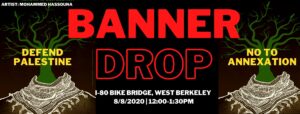 Day of Resistance Bay Area No to Annexation Banner Drop!
Day of Resistance Bay Area No to Annexation Banner Drop!
Saturday, 8 August
12:00 pm
I-80 Bridge
Berkeley, CA
Facebook: https://www.facebook.com/events/222402215705454/
Organized by the Palestinian Youth Movement
Dearborn, Michigan:
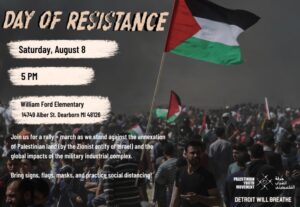 Day of Resistance
Day of Resistance
Saturday, 8 August
5:00 pm
William Ford Elementary
14749 Alber Street
Dearborn, MI
Facebook: https://www.facebook.com/events/3377794328949210/
Organized by the Palestinian Youth Movement
Phoenix/Tempe, Arizona:
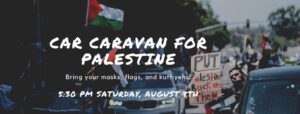 Car Caravan for Palestine
Car Caravan for Palestine
POSTPONED
Facebook: https://www.facebook.com/events/291325265286953/
Organized by Students for Justice in Palestine at Arizona State University
Long Beach, California:
Witness for Palestine
Saturday, 8 August
12:00 pm
Corner of 2nd street and PCH
Long Beach, California
More info: https://www.facebook.com/People-for-Palestinian-Israeli-Justice-112553376225283
Organized by People for Palestinian-Israeli Justice
Manchester, England:
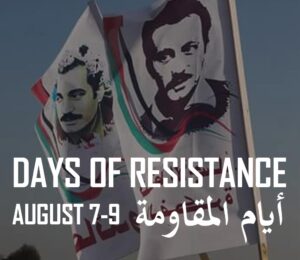 Speak Out for Palestinian Resistance
Speak Out for Palestinian Resistance
Saturday, 8 August
12:00 pm
Piccadilly Gardens
Manchester, Britain
Facebook page: https://www.facebook.com/events/806939446504580
Organized by Victory to the Intifada and Fight Racism Fight Imperialism
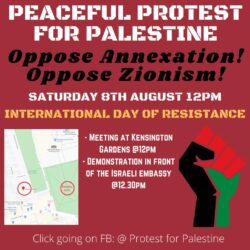 London, England:
London, England:
International Day of Resistance for Palestine
Saturday, 8 August
12:00 pm
Kensington Gardens
Then march to Israeli Embassy
London, England
Facebook: https://www.facebook.com/events/290621975595518
Organized by Protest for Palestine and Victory to the Intifada
Liverpool, England:
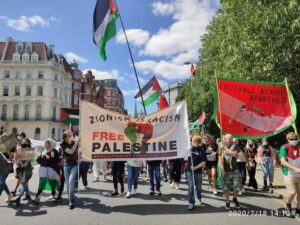 International Day of Resistance for Palestine
International Day of Resistance for Palestine
Saturday, 8 August
12:30 pm
Church Street
Liverpool, UK
Facebook: https://www.facebook.com/events/290466158875569/
Organized by Fight Racism! Fight Imperialism!
Brighton, England:
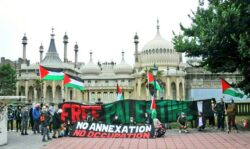 Solidarity with Palestine and the Days of Resistance
Solidarity with Palestine and the Days of Resistance
Saturday, 8 August
12:00 pm
Clock Tower
Brighton, UK
Learn more: http://brightonpsc.org
Organized by Brighton and Howe Palestine Solidarity Campaign
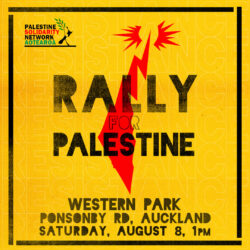 Auckland, New Zealand:
Auckland, New Zealand:
Rally for Palestine
Saturday, 8 August
1:00 pm
Western Park, Ponsonby
Auckland, New Zealand
More info: https://samidoun.net/event/auckland-rally-for-palestine/
Palestine Network Aotearoa – Auckland Tamaki Makaurau
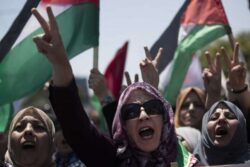 Glasgow, Scotland:
Glasgow, Scotland:
Long Live Palestine! Protest
Saturday, 8 August
1:00 pm
Outside Lidl
Victoria Road
Glasgow, Scotland
Facebook: https://www.facebook.com/events/722899948493778/
Organized by Fight Racism! Fight Imperialism!
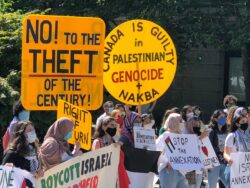 Vancouver, Canada:
Vancouver, Canada:
Defend Palestine and Boycott Israel! Protest
Saturday, 8 August
2:00 pm
Broadway and Cambie
Vancouver, BC, Canada
Facebook page: https://www.facebook.com/events/3444171322281377
Organized by BDS Vancouver, Canada Palestine Association, Samidoun and IJV UBC
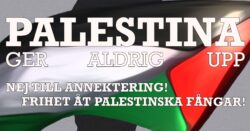 Gothenburg, Sweden:
Gothenburg, Sweden:
Palestine will never give up! Protest
Saturday, 8 August
2:00 pm
Gustav Adolfs Torg
Gothenburg, Sweden
Facebook: https://www.facebook.com/events/2427427610881051/
Organized by Samidoun Gothenburg
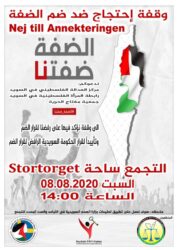 Malmo, Sweden:
Malmo, Sweden:
No to Annexation
Saturday, 8 August
2:00 pm
Stortorget
Malmo, Sweden
Facebook: https://www.facebook.com/events/288683195737750
Organized by Palestinska Rättvisecentret i sverige
Knighton, Wales:
 International Fast for Peace – Workshop on the Annexation of Palestine
International Fast for Peace – Workshop on the Annexation of Palestine
Saturday, 8 August
3:00 pm
Knighton War Memorial
Knighton, Wales
Facebook: https://www.facebook.com/events/1389941944532500/
Organized by XR Peace
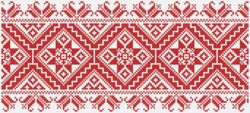 Montreal, Quebec:
Montreal, Quebec:
Demonstration for Palestine/Manifestation pour la Palestine
Sunday, 9 August
2:00 pm
Jarry Station
Montreal, Quebec
Facebook: https://www.facebook.com/events/283616929403882/
Organized by a broad coalition of Montreal groups including SPHR McGill, Independent Jewish Voices, Academics for Palestine, Imaging Apartheid and more
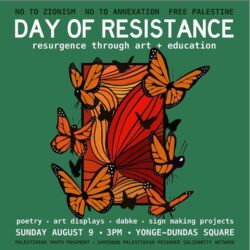 Toronto, Canada:
Toronto, Canada:
Day of Resistance – Resurgence through Art and Education
Sunday, 9 August
3:00 pm
Yonge-Dundas Square
Toronto
More info: https://www.instagram.com/p/CDkdVnDg1EC/
Organized by the Palestinian Youth Movement
Copenhagen, Denmark:
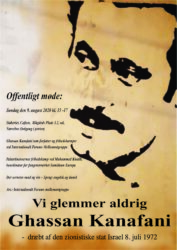 Commemoration of Ghassan Kanafani and the Struggle for Palestine
Commemoration of Ghassan Kanafani and the Struggle for Palestine
Sunday, 9 August
3:00 pm
Solidaritetshuset
Griffenfeldsgade 41
Nørrebro, Copenhagen, Denmark
More info: https://samidoun.net/event/copenhagen-sunday-cafe-remembering-ghassan-kanafani-ongoing-struggle-against-zionist-colonialism/
Amsterdam, Netherlands:
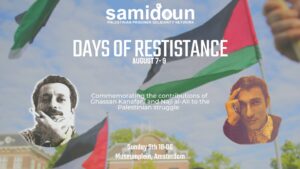 Days of Resistance – Honoring Ghassan Kanafani and Naji al-Ali
Days of Resistance – Honoring Ghassan Kanafani and Naji al-Ali
Sunday, 9 August
6:00 pm
Museumplein
Amsterdam, Netherlands
Facebook: https://www.facebook.com/events/220642382587092
Organized by Samidoun Netherlands
Cleveland, Ohio:
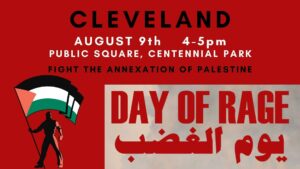 Day of Rage Protest for Palestine
Day of Rage Protest for Palestine
Sunday, 9 August
4:00 pm
Cleveland Public Square
Centennial Park
Cleveland, Ohio
Facebook: https://www.facebook.com/events/2770679799877493/
Organized by Midwest SJP
Long Beach, California:
Witness for Palestine
Sunday, 9 August
12:00 pm
Corner of 2nd street and PCH
Long Beach, California
More info: https://www.facebook.com/People-for-Palestinian-Israeli-Justice-112553376225283
Organized by People for Palestinian-Israeli Justice
Charleroi, Belgium:
This event is postponed due to Covid-19. Contact Plate-Forme Charleroi-Palestine for more details!
Facebook page: https://www.facebook.com/events/607152996900798
Organized by the Plate-Forme Charleroi-Palestine
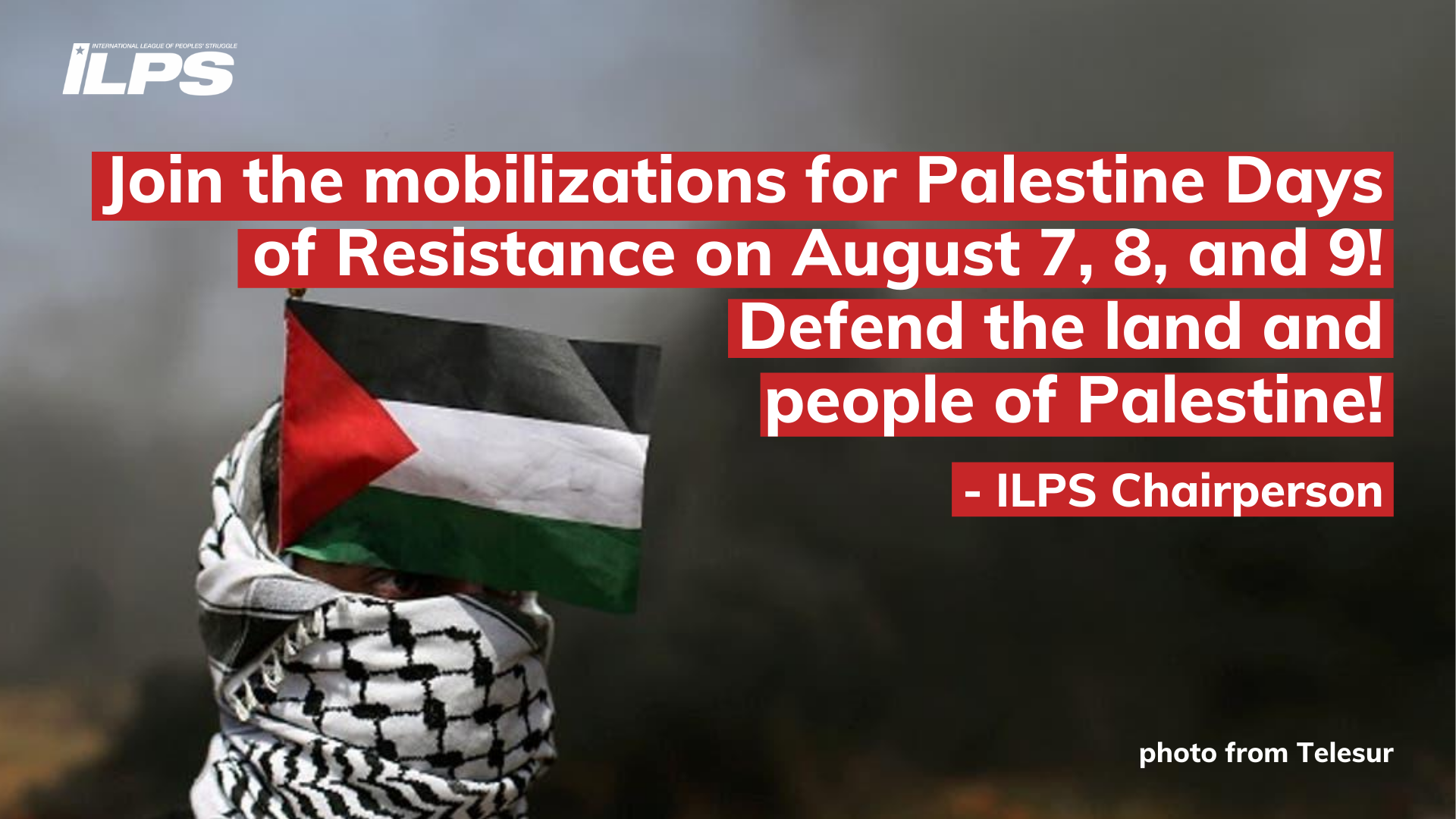

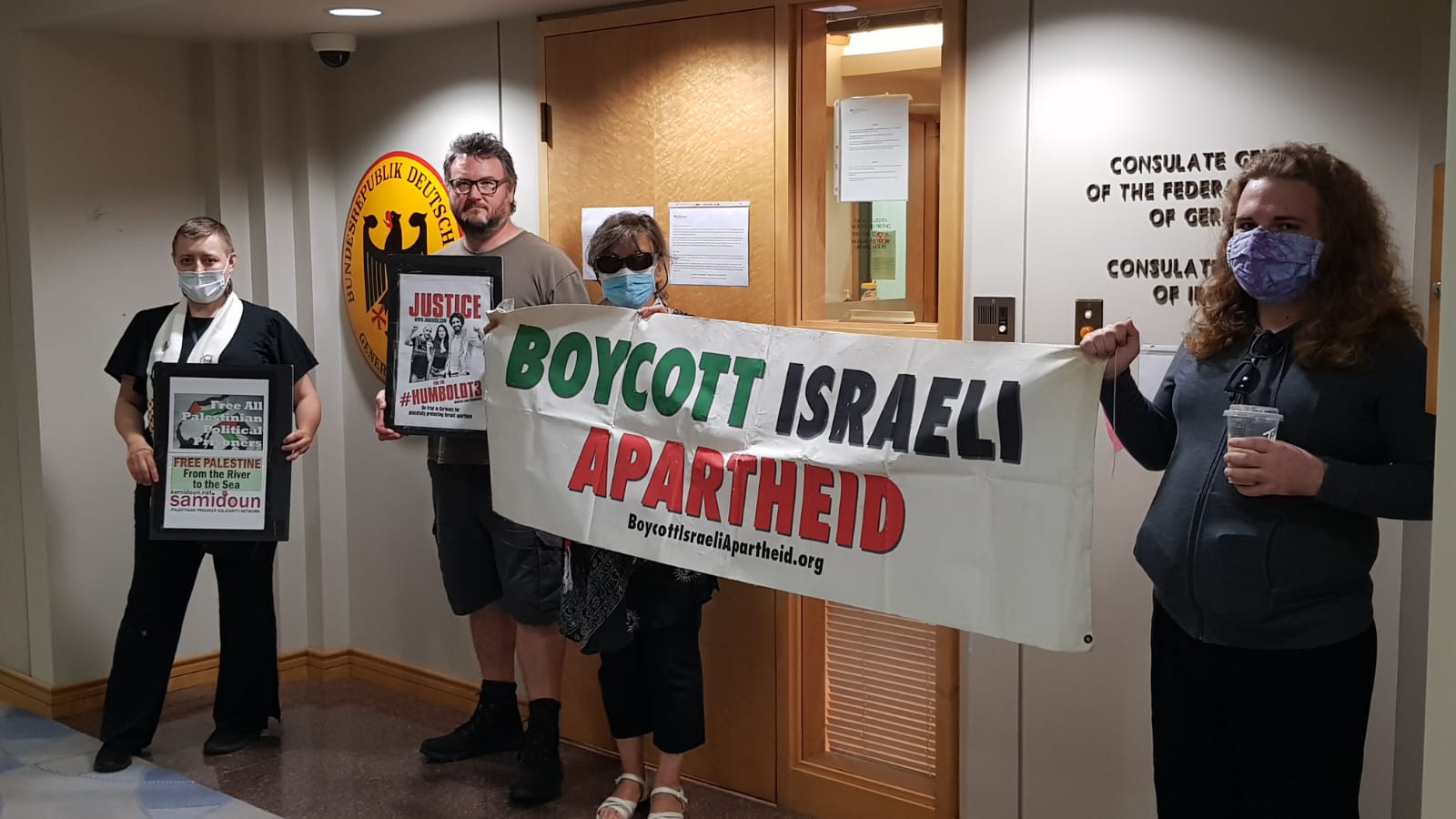
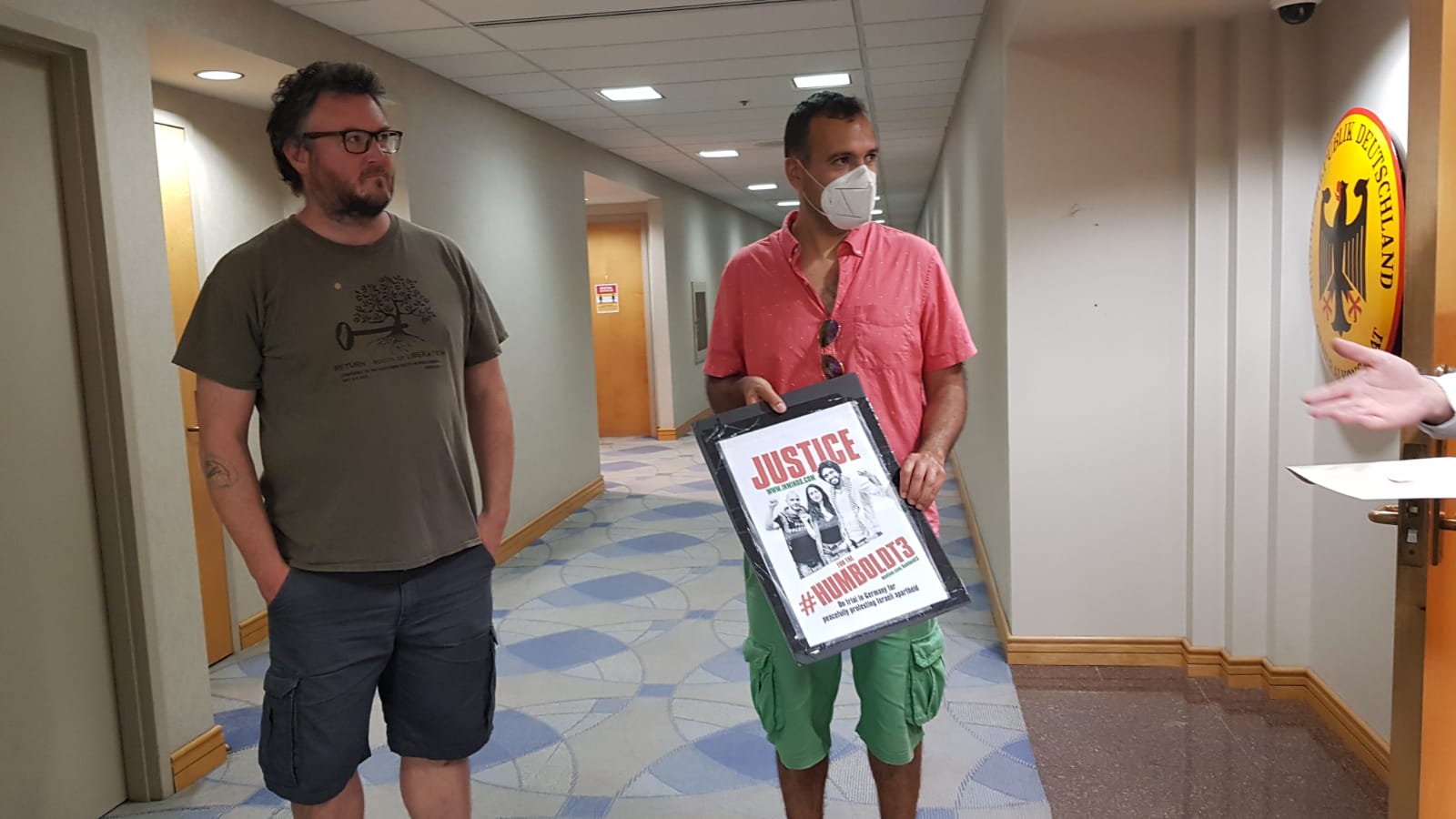
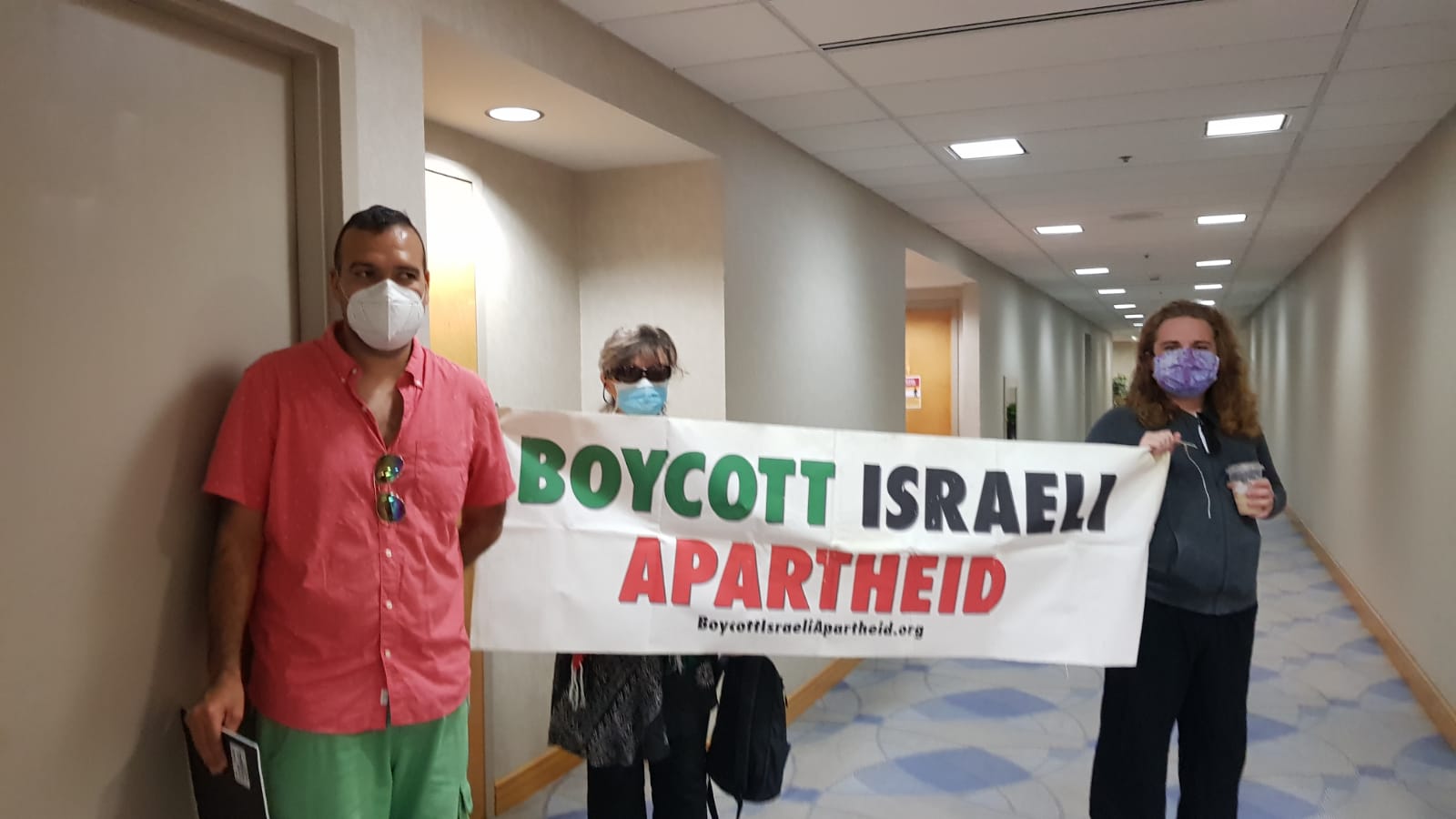
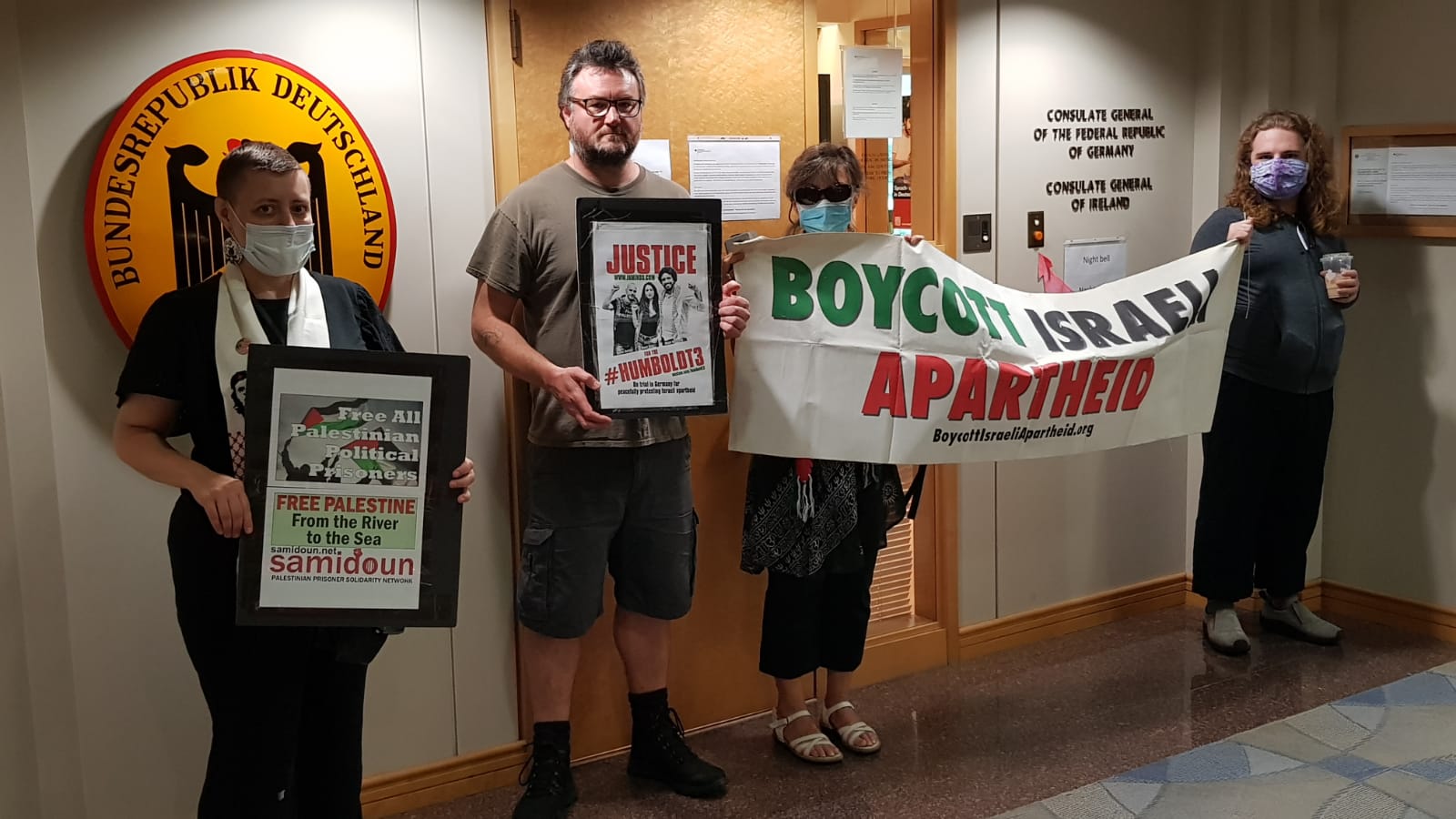
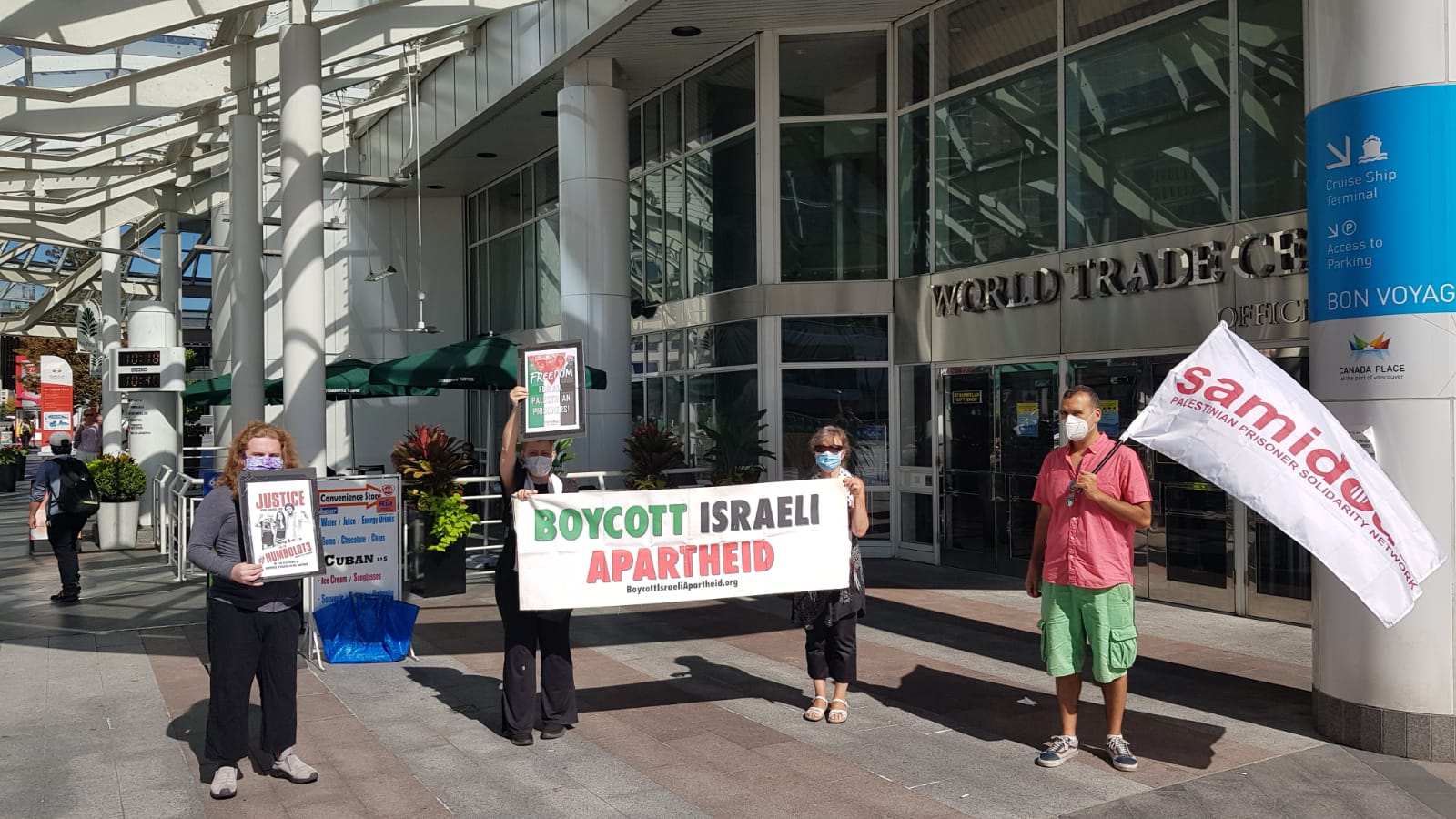
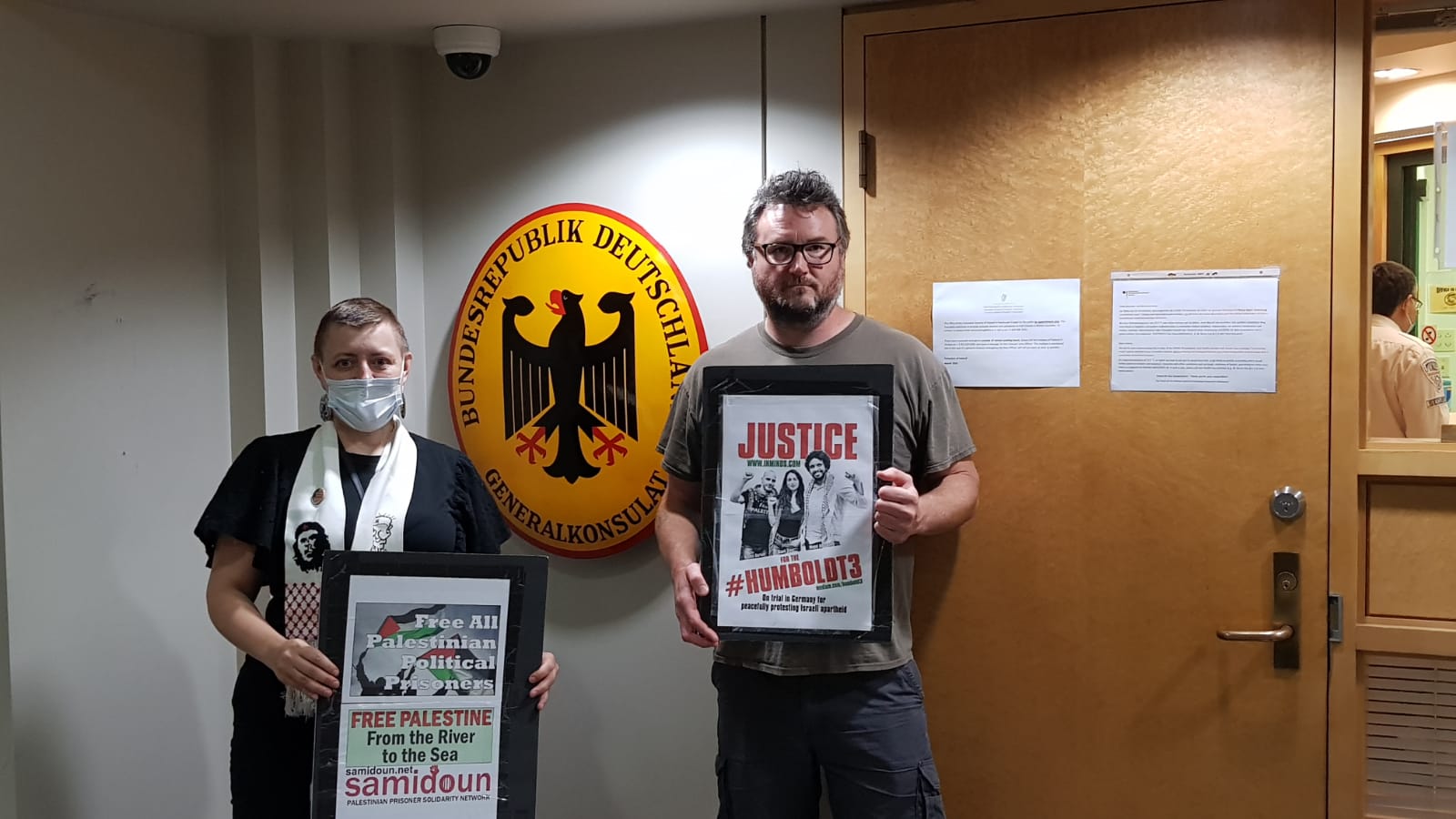

 Ghassan Kanafani and Naji al-Ali: How to restore their path?
Ghassan Kanafani and Naji al-Ali: How to restore their path? Online Event (in Arabic):
Online Event (in Arabic): Day of Resistance for Palestine
Day of Resistance for Palestine DAY OF RESISTANCE Demonstration to Defend Palestine
DAY OF RESISTANCE Demonstration to Defend Palestine Stop Annexation in Palestine – Palestinian People’s Kitchen with Mohammed Khatib
Stop Annexation in Palestine – Palestinian People’s Kitchen with Mohammed Khatib Day of Resistance Demonstration and Car Caravan
Day of Resistance Demonstration and Car Caravan Madrid, Spanish State:
Madrid, Spanish State:  Stand Out for the Days of Resistance
Stand Out for the Days of Resistance Days of Resistance Car Caravan
Days of Resistance Car Caravan Day of Resistance Bay Area No to Annexation Banner Drop!
Day of Resistance Bay Area No to Annexation Banner Drop! Day of Resistance
Day of Resistance Car Caravan for Palestine
Car Caravan for Palestine Speak Out for Palestinian Resistance
Speak Out for Palestinian Resistance London, England:
London, England:  International Day of Resistance for Palestine
International Day of Resistance for Palestine Solidarity with Palestine and the Days of Resistance
Solidarity with Palestine and the Days of Resistance Auckland, New Zealand:
Auckland, New Zealand: Glasgow, Scotland:
Glasgow, Scotland:  Vancouver, Canada:
Vancouver, Canada: Gothenburg, Sweden:
Gothenburg, Sweden: Malmo, Sweden:
Malmo, Sweden: International Fast for Peace – Workshop on the Annexation of Palestine
International Fast for Peace – Workshop on the Annexation of Palestine Montreal, Quebec:
Montreal, Quebec: Toronto, Canada:
Toronto, Canada: Commemoration of Ghassan Kanafani and the Struggle for Palestine
Commemoration of Ghassan Kanafani and the Struggle for Palestine Days of Resistance – Honoring Ghassan Kanafani and Naji al-Ali
Days of Resistance – Honoring Ghassan Kanafani and Naji al-Ali Day of Rage Protest for Palestine
Day of Rage Protest for Palestine